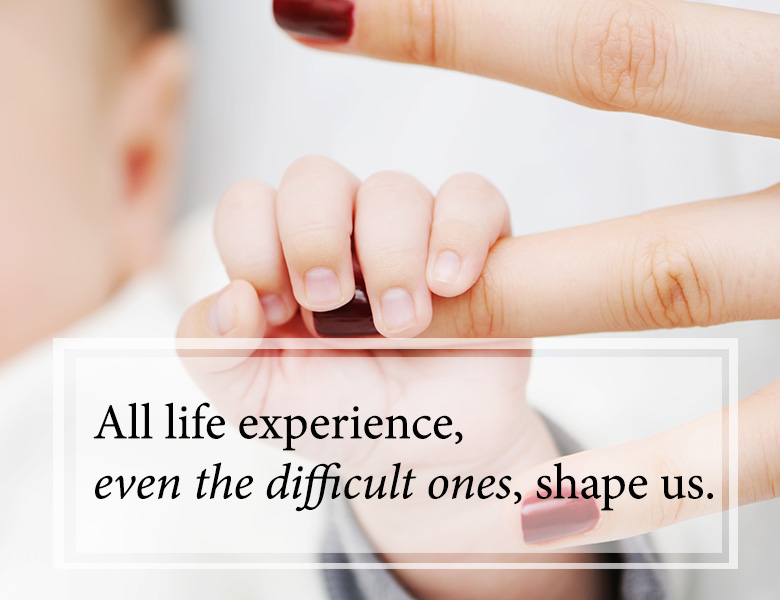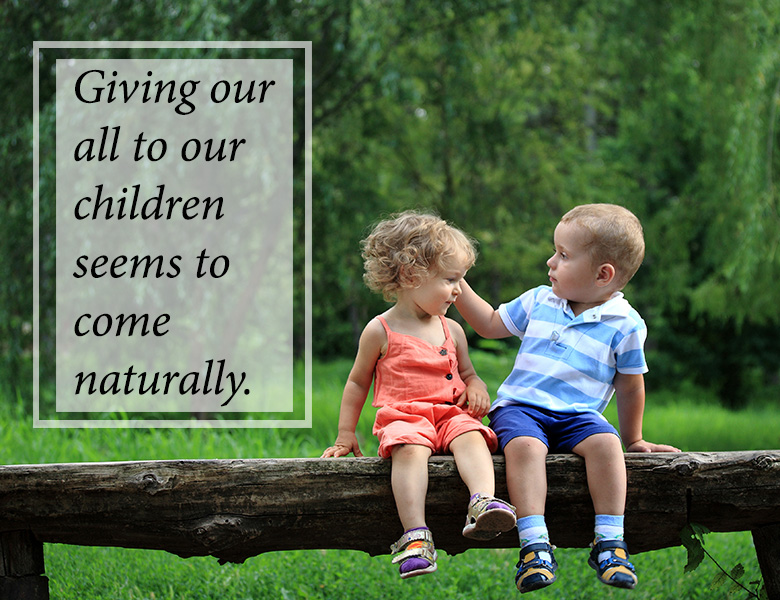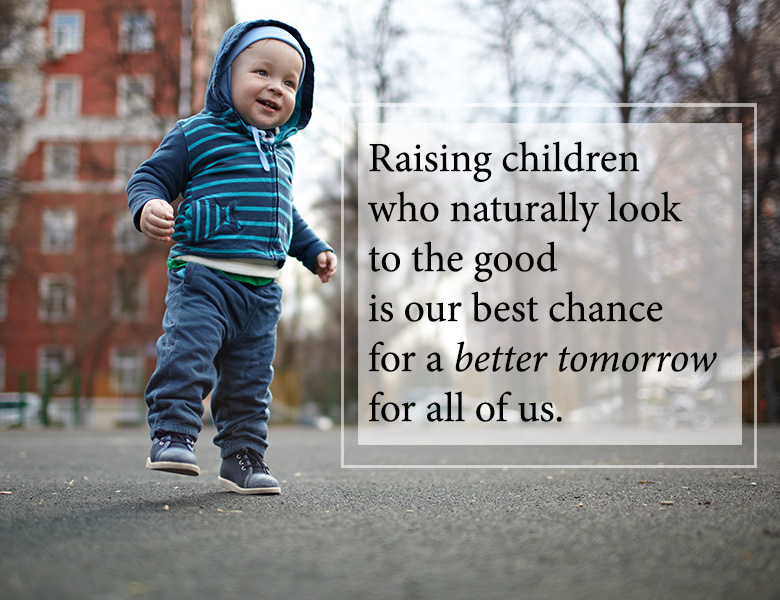I was 31 years old when I gave birth to my first child. Despite an M.D. after my name, and successful completion of a family practice residency under my belt, I soon discovered I had a lot to learn about being a parent. It took BEING one to learn and grow into the role. By about the age of 45, I could more honestly say, “OK, now I feel rooted in being a parent.” By then I already had a teenager in the house, and two more not far behind.
It’s one thing to read parenting books (or even this article), and quite another to translate the learning to each unique individual, situation and moment in time.
Mistakes were made. Oh, how I wish for another chance for certain moments! And yet, then as now, I have stuck to this bit of wisdom:
Do your best.
My best is much better after a good night’s sleep than it is after a long day at work. My best is much better when I feel healthy than when I’m puny with a cold. My best is much better when, well, things go my way.
But just as the bones in our body require constant pressure of use in order to stay strong, so too all life experiences, even the difficult ones, shape us. We cannot hope to become our best selves without some challenges along the way. In having the Courage to Let Go – of the past, of self-judgment, of rigid expectations – every day offers a new opportunity for us to Learn and Grow, to blossom into the best version of ourselves.

Today, I am the delighted grandparent of two precious young lives.
In fact, as I take my place as an elder in society (I’ll be 60 this year), there are many young children and their parents in my life. To these I can offer my heart, my listening ear, and – when it is asked for – my counsel born of “been there, done that.”
(I should add that my sympathy for my own parents grows daily, as I have come to recognize how hard it can be to let go of certain choices made by my adult children. I have to constantly remind myself to respect them, their journeys, their learning, and their sovereign right to choose for themselves. )
I offer here five practical bits of advice for parents.
These are born of my own experience. I hope they serve.
- Make self-care a priority.
- Create a safe container.
- Recognize the divine Essence within your child.
- Pick your battles.
- Practice gratitude.
Parenting Tip #1 – Make Self-Care a Priority.
My husband is an expert at this. His work has taken him on the road a lot. Early morning flights; intense coaching, training and facilitation of corporate teams; nights away from home in a series of sterile hotel rooms.
He has a routine for hotel stays: his favorite toiletries are carefully set up in the bathroom and as often as possible, he will include a morning yoga routine to start the workday. At home, he knows how to chill by reading a book, watching some T.V., taking long walks, or savoring his coffee on the back deck.
Early in our marriage, I used to resent this behavior, as I spent precious days off work vacuuming and cleaning the house…circling right around him sitting there in his comfortable chair. But then I’m the one who ended up with severe adrenal exhaustion, which took me a year to recover from after I closed, of all things, my holistic medical practice.
I’d become as sick as my own patients! Lesson learned.
It’s nice to have a tidy house, but not worth ruining my health over. And also not worth missing bedtime snuggling, family outings and all manner of precious shared moments with one’s children, who grow up all too fast.
For many, giving our all to our children seems to come naturally. Yet, just as when taking an airplane trip, it is best to put our own oxygen masks on first before attending to the children. Moreover, in life, it is wise not to wait for an emergency before attending to self-care. As parents we need all the strength we can for the next step, which is to create a safe container.

Parenting Tip # 2 – Create a Safe Container.
Most parents make sure there is a safe container for their children on the physical level: safety locks on cabinets and staircase gates, removal of toxic plants and sharp things from easy reach, and so forth. (We have perhaps overdone this in modern society, and there is a movement back to teaching young people respect of and proper use of so-called dangerous tools from an earlier age.)
At least as important as physical safety, however, is creating a safe space for authentic emotional expression. As a society, we have come to label anger, grief and fear as “negative” or “bad” and yet each serves a role.
Anger creates boundaries.
Grief shows us what we value through the pain of loss.
Fear warns us of possible danger.
Unfortunately, conventional social conditioning often progarams internal beliefs such as “big boys don’t cry” and “it’s not nice to be angry,” yet suppression of natural emotions can lead to everything from depression, resentment and passive-aggressive behavior on one hand, to daredevil behavior and erratic violent outbursts on the other.
Parents can instill a sense of safety by modeling the healthy expression of so-called negative emotions. We can take our own “time-out”, perhaps with a brisk walk or with a request for a moment of silence while we collect ourselves internally.
My kids learned that their mother had a patience gauge, and when it was running low, I’d give them advance warning that the engine might blow. We can speak of our fear of and our grief over loss, while also sharing stories of gratitude…for what has been lost, for what remains. And if we trip up by saying or doing something we are not proud of, we can walk the talk, using our Courage to be Vulnerable, and make the necessary amends.
In age-appropriate ways we can express something like, “I would have preferred not to yell just now. I realize I was afraid you would get hurt, and then I was angry because you didn’t listen to me. What is going on for you just now?”
When it comes to anger in particular, it is also important to keep reminding our children that our expression of this emotion is in response to their action, and not to them as a person. We don’t have to like our kids all the time, yet our unconditional love should always shine through. The best testament to success in this is when grown children take the initiative to stay in touch with their parents, appreciating the foundation of strong family roots to move through challenges and reach for dreams.
Parenting Tip #3 – Recognize the divine Essence within the young child.
Parents who have more than one child can tell you: each is unique.
I could tell that even during pregnancy, my food cravings and dreams were different while carrying each of my three children. And then, within the first seven formative years, my husband and I already intuited a future course for each child based on his or her particular interests, skills and challenges.
At minimum, it is good to remember that children are sovereign beings – they may depend on their primary caretakers for their basic needs and be less capable physically and mentally than an adult – but nonetheless each deserves respect equal to that accorded to adults. The fact that we have lost sight of this parallels our lack of respect for “others”, whether human or non-human.

As a society we have lost appreciation for the intricate, interwoven web of life. We are quick to discard the old as useless, and don’t always value the candid honesty of as yet unadulterated youth. Hans Christian Andersen’s well-known fable “The Emperor has New Clothes,” in which it takes a child to speak the obvious truth to power, would be worth re-reading on a regular basis! Let us, then, consciously choose to allow our children to teach us, to remind us how to laugh and play and dream and believe in the impossible.
Parenting Tip #4 – Pick Your Battles
The first thing to figure out is what is non-negotiable in your own mind. This will be based on family values and safety precautions. Examples might include “We don’t run into the street,” “We don’t steal,” and “We tell the truth.” This last one will be much easier to follow if your children have come to trust the safe container you provide, one in which they can make mistakes (Tip #2) and are treated with respect and given the space to learn and grow (Tip #3.)
An important lesson to learn as a parent is that our zealous caretaking often masks controlling behavior that does not respect a child’s right to make their own choices and have their own preferences.
As parents, we need to keep asking ourselves, “Is this demand I am making actually essential?” Children learn self-sufficiency from making choices, evaluating the results and then making new choices. Whenever possible, allow this kind of freedom, for instance in the clothes they wear or what they choose to put on their dinner plate.
This is not about caving in.
Using the example of food, it might look something like this: the child supervises the portion that is served and must finish the plate, or else defaults on dessert. She or he learns it is better to take smaller portions and then ask for seconds.
Experiments have shown that when given a veritable smorgasbord of food to choose from, children will over time gravitate toward a balanced diet, recognizing that this makes them feel better. And as always, children learn by observation. When parents eat their vegetables, children do to. When parents enjoy their desserts, savoring each bite so that smaller portions will do, children eventually follow suit. Before you know it, your children may find pleasure in preparing delicious food with, and for, you. Ours certainly do!
Parenting Tip #5 – Practice Gratitude
The onslaught of media messages today – whether in the news, on social media, or in advertisements – so often seek to grab attention by playing to fear. Fear of lack, loss, inequality, environmental disaster, you name it.
It doesn’t help that is becoming harder and harder for parents to limit “screen time.” Even if there are house rules that restrict time in front of the TV, on a computer, smart phone or other portable electronic device, children need to learn to navigate the rest of the world and what is being thrown at them.
One way to do this is to make it a family ritual to express gratitude.
Gratitude for the small things and for the big things. For each other. For what we have and what we dream of. For the capacity to dream. Even for the lessons we have learned when we fail at something.
I’d like to say do this at dinner, although I’m a realist enough to know that a sit-down meal is becoming less and less the norm as children are dashed from one after school activity to another. With a bit of imagination, however, gratitude can have its say.
Put a white board in a central place, supply colorful markers, and have family members write messages of appreciation or draw pictures of what they are grateful for. Make it a part of the bedtime routine to express appreciation for each other and for some gift of the day. What we focus on grows, and raising children who naturally look to the good is our best chance for a better tomorrow for all of us.
Spiritual warriors are taught: “No one can do it for you, and you can’t do it alone.” I think this applies just as much to parents. Your journey as a parent is your own, and yet it makes great sense to surround yourself with those who are a bit further on the path than you are, those who have the courage to be authentic about their own mistakes as much as their successes as parents. Often all that is needed is a listening ear and or a small word of encouragement, and other times fellow parents can point us to important resources for our children and ourselves.

It has been said, “It takes a village to raise a child.” As you contemplate the five parenting tips offered here, it might be helpful to share your explorations with other parents, and to encourage each other in what is certainly the most important job in the world, that of being a parent.
Take the time to identify your “village” today, and do share your own parenting tips in the comments below.

